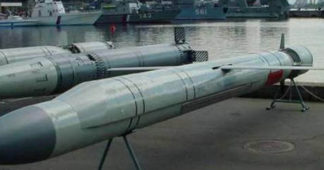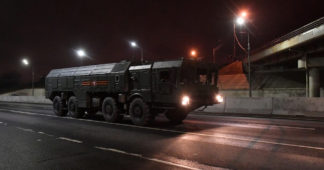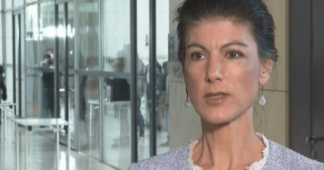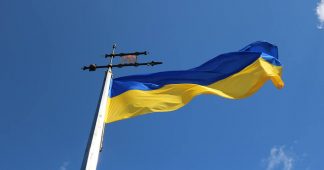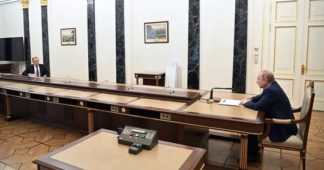GEOFOR Interview – carried out by Serge Duhanov for Russia SV Press with PK
First published by GEOFOR on 10 May 2022
GEOFOR Question
Greetings! Since our last conversation, truly historic, epochal changes have taken place in the world. The struggle between Russia and the West is only gaining momentum. How do you see the prospects for this process? How far can this confrontation go?
Peter Koenig Reply
Predicting an outcome at this point is close to impossible. We are talking about a proxy-war, the west / NATO against Russia, played out in Ukraine and eventually – potentially – I trust not – in the European theatre.
This would be the third WW on European territory in a little over a century.
At least today – 6 May – the UN Security Council for the first time has encouraged both parties to seek negotiations for peace, or at least a cease fire. Of course, that doesn’t mean much, since President Zelensky is totally controlled by the west, predominantly Washington and Brussels, meaning NATO.
If this call for negotiations does not amount in anything tangible, in terms of at least an armistice agreement, with the strong expectations that it may eventually be leading to Peace, the conflict could go on for a long time – and escalate further, indeed risking a WWIII scenario; emerging, God forbid, in a nuclear war. Let’s not even think about it.
On the other hand, let’s not forget, that in her entire 246 years of history, the US have known only 15 years without a conflict. The US economy is to almost 60% based on war, direct war-industry and war-related services and industries. Therefore, a new war for the US is necessary, now, with the hegemon USA faltering, more than ever.
As Russian Foreign Minister Sergey Lavrov said in an interview with Al Arabiya, President Zelenskyy is totally in the hands and under control of the west. While Zelenskyy accepted several of Russia’s conditions, he backed out of his commitment after he got instructions from US / NATO to the contrary. See this 59-min. video interview https://www.youtube.com/watch?v=_DwOZOaJfY4 .
GEOFOR Question
Today, a number of states are increasing arms supplies to Kiev. How many more weapons can Western countries supply to Ukraine, as their stockpiles are not unlimited after all?
Peter Koenig Reply
Supplying Kiev with arms is a western war-industry bonanza. As mentioned before – the US, for one, depends with her economy to mor than 50% on wars and armed conflicts, carried out either directly or by proxy. The Ukraine-Russia war is a proxy war for the US / NATO – and by NATO-association also for Europe. Therefore, rather than depleting western weapon stockpiles, their war industry is running on overdrive. “War is good for business” – has become a common, almost “household- phrase”; it indicates the type of dystopian world we are living in.
GEOFOR Question
Returning to the previous question: don’t you think that Russia should have blocked the western borders of Ukraine in response? And at the same time, maybe it’s time for the Kremlin to stop supplying oil, natural gas as well as other resources and goods to Europe and the United States?
Peter Koenig Reply
It’s difficult to block borders.
Russia never had the intention – and still doesn’t to “take-over”, as in absorbing – Ukraine. Russia had and still does have four objectives: No NATO – ever – in Ukraine; making Ukraine an independent and neutral country; denazifying Ukraine; and, last but not least, protecting the two overwhelming Russian and Russian-speaking Donbass Provinces, Donetsk and Luhansk. The Donbas area, you may recall, is constantly being attacked by the Nazi-Azon battalion, having caused about 14,000 civilian deaths since the western engineered February 2014 Maidan coup in Kiev.
These are simple objectives, offered by Russia. Zelenskyy originally accepted them against Russian security measures, but then backtracked, when Washington / NATO said nyet. See above Lavrov-interview.
GEOFOR Question
How long can the unity of the West last on the issue of sanctions against Russia against the backdrop of their own internal problems, rising prices, protests, etc.?
Peter Koenig Reply
This is another good question. In fact, already now, and since the very beginning of the this insane “sanctions game”, the west is the primary loser. Not Russia, but the west, predominantly Europe, is suffering from their own sanctions. These are sanctions imposed by the US and Europe, the spineless European Union let herself being coerced in repeating them.
It is clear that Europe depends much more on Russian vital supply lines – like energy – especially gas – than vice-versa. Germany, for example, depends to at least 50% on Russian gas; and this is a conservative estimate. The rest of Europe also needs Russian gas as a vital energy supply source.
The reason for Europe to go along with the “sanctions”, may be a bit more complex than meets the eye. There is a little-known fact, known only to few people: Germany, the lead country in the EU, is by no means free and independent. Germany still lives under an armistice agreement since WWII – no Peace Agreement has ever been granted by the winners of the war, especially the United States. Several attempts by German Chancellors, to break loose from this – we might as well call it slavehood – failed. Washington reacted “no way”, or else…..
A case in point is Nord Strom 2. It was killed not by Germany, but by Washington. To the detriment of all of Europe.
So far, the EU has followed the dictate of her major economic and defense (NATO) partner. How long they will adhere to this unspoken rule – is anyone’s guess. From my point of view, the breaking point is near. The moment, when Europe has to make her own decisions, independent of the coercion Germany is under.
In the meantime, President Putin and his brilliant economic adviser, Sergey Glazyev, have come up with an ingenious solution. Russia will honor her contractual obligations supplying the west with gas – and other hydrocarbons, provided that Russian energy is paid in rubles. Not in US-dollars, not in Euros, but in Russian Rubles. This rule applies to all countries which acquiesced to Washington’s request to dish-out sanctions on Russia, concerning more than 40 countries. See this https://graphics.reuters.com/UKRAINE-CRISIS/SANCTIONS/byvrjenzmve/ .
The Ruble-rule has originally created quite some protests and upheavals in Europe, to the point where Mme. Ursula van der Leyen, President of the European Commission (EC), naively called out, this is unacceptable…. Well, its simple. It’s either rubles or no gas. Eventually most countries have accepted the Russian conditions, quietly, no fuss, and especially no western mainstream media coverage.
This could become a bonanza for Russia: The Petro-Ruble replacing the faltering Petro-Dollar. It’s very befitting for the west and for the western “sanction-prone” monetary system. More and more countries dare defecting the fiat-money system, for mor stable currencies, like the gold and national economy-backed ruble and Chinese Yuan.
Most frauds eventually come to an end. The fiat US-dollar scam has lasted long enough – more than a century, since the fraudulently passed 1913 Federal Reserve Act. Its time that the dollar is being replaced – ringing the world into a more honest, more equitable socioeconomic system.
GEOFOR Question
The United States is increasing its activity in the Pacific region: the AUKUS block, nuclear submarines for Australia, cooperation on hypersonic weapons with the Australians and the British, etc. Does this mean that, on the one hand, Washington is working to weaken Europe and NATO, and on the other hand, it is preparing a new strategic project directed against China and Russia?
Peter Koenig Reply
The AUKUS block is an expansion of NATO into the Pacific. Its not a weakening of NATO per se, quite to the contrary. It is meant to further encircle China, via the South China Sea and indirectly Russia.
Under this deal Australia would receive from the British war industry nuclear sub-marines – replacing and cancelling a 2016 contract for French submarines.
As a byline, according to ABC-Australia new (see this https://www.abc.net.au/news/2022-04-01/cancelled-french-submarine-program-cost-billions/100959082) , the broken submarine contract with France, could cost Australian tax-payers as much as 5 billion dollars.
Aukus, is a trilateral security pact between Australia, the United Kingdom, and the United States, announced on 15 September 2021 for the Indo-Pacific region. Under the pact, the US and the UK will help Australia to acquire nuclear-powered submarines. The pact would essentially expand NATO into the Pacific region.
On the other hand, NATO is not intended to be weakened in Europe. Quite to the contrary. While several EU NATO members have quietly started expressing doubts about the usefulness of NATO in times of Peace, the Ukraine-Russia proxy-war has changed the tune.
Worldwide highly funded propaganda of Russian aggression, makes “everyone” scramble for more security. European “leaders” (sic) – most of them scholars of Klaus Schwab’s Academy for Young Global Leaders are implanted by the World Economic Forum’s (WEF) and its invisible handlers. They will follow their learned script of working towards the Great Reset, a global tyranny, eventually leading to the western Globalists dream of a One World Order (OWO), or a Global Governance, led by Washington. That’s their pipedream.
In the meantime, NATO in Europe may soon have two new members – if their dream comes through, Sweden and Finland. They are considering applying for NATO membership. Mr. Stoltenberg, NATO’s Secretary General, has already said, he would favor an accelerated accession, if indeed the two countries would apply. According to Stoltenberg, full membership could be possible by June 2022.
Just imagine, Finland that shares a 1,340-kilometre-long border with Russia. Sweden, however, shares no border with Russia, and Sweden and Russia have not been at war with each other for at least the last two centuries. Sweden joining NATO might, therefore, be considered a specially sever act of aggression by Russia.
In the case of Finland, if Ukraine is any indication, Russia would most certainly not tolerate another NATO country – Finland – on her doorstep. This could become another point of contention, escalating the war scenario – and again, God-forbid, towards a hot (nuclear?) WWIII scenario.
An overwhelming majority of the people in both Finland and Sweden are against their countries’ accession to NATO. For the sake of world piece, we may just hope that the leadership of the two countries listen to their people.
* Peter Koenig is a geopolitical analyst and a former Senior Economist at the World Bank and the World Health Organization (WHO), where he has worked for over 30 years on water and environment around the world. He lectures at universities in the US, Europe and South America. He writes regularly for online journals and is the author of Implosion – An Economic Thriller about War, Environmental Destruction and Corporate Greed; and co-author of Cynthia McKinney’s book “When China Sneezes: From the Coronavirus Lockdown to the Global Politico-Economic Crisis” (Clarity Press – November 1, 2020)
Peter is a Research Associate of the Centre for Research on Globalization (CRG).
He is also is a non-resident Senior Fellow of the Chongyang Institute of Renmin University, Beijing.
We remind our readers that publication of articles on our site does not mean that we agree with what is written. Our policy is to publish anything which we consider of interest, so as to assist our readers in forming their opinions. Sometimes we even publish articles with which we totally disagree, since we believe it is important for our readers to be informed on as wide a spectrum of views as possible.
